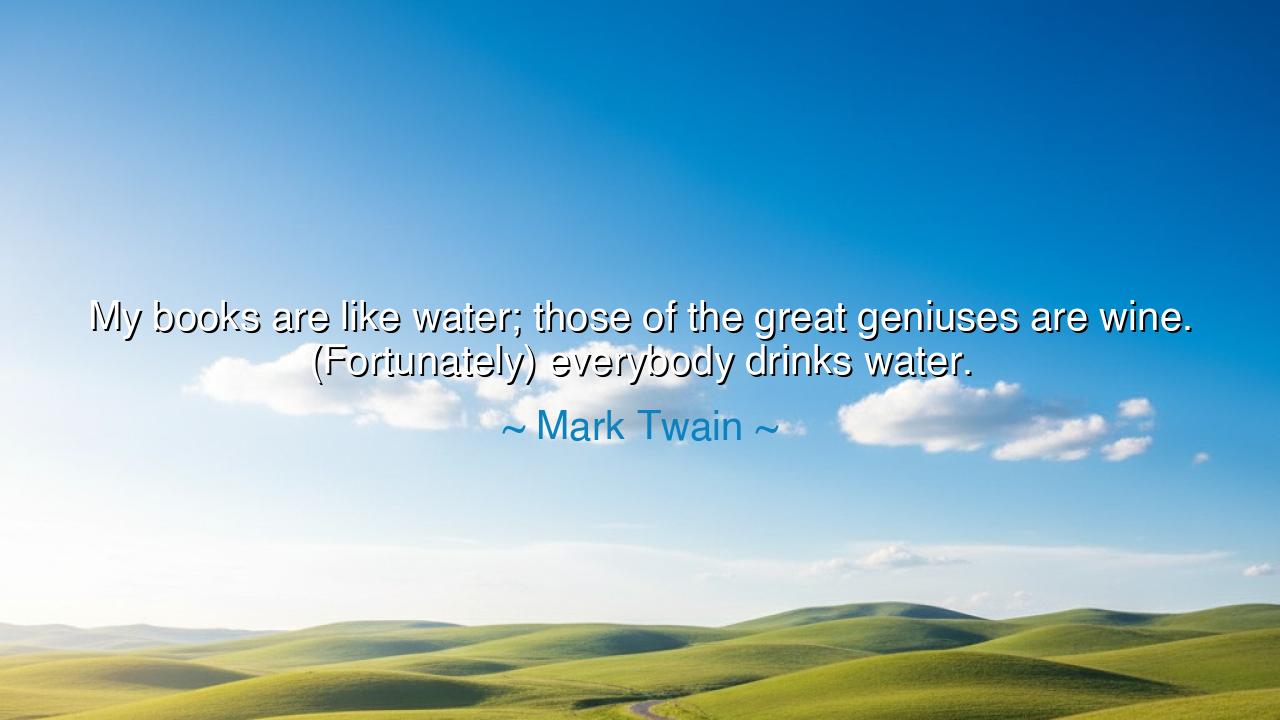
My books are like water; those of the great geniuses are wine.
My books are like water; those of the great geniuses are wine. (Fortunately) everybody drinks water.






The great American sage of laughter and truth, Mark Twain, once said with his trademark mixture of humility and brilliance: “My books are like water; those of the great geniuses are wine. (Fortunately) everybody drinks water.” These words, light as a jest, conceal the wisdom of an ancient philosopher. Twain understood the strange economy of the spirit — that while genius may intoxicate the few, simplicity nourishes the many. In this single sentence, he revealed both his own place in the world and a timeless truth about art, humanity, and humility.
To call one’s work “water” is not to diminish it, but to declare it essential. For what is water, if not life itself? The world may praise the refined flavor of wine, but it cannot survive without the purity of water. Twain, a man of the people, knew his gift was not to write for scholars or kings, but for the human heart — for the farmer by his lamp, the child by the hearth, the traveler by the fire. He wrote of riverboats and mischief, of innocence and hypocrisy, with the clarity of a stream that reflects both heaven and earth. In this, he made literature accessible, necessary, and enduring.
The great geniuses, whose works he likened to wine, are those whose art is rare, complex, perhaps reserved for special occasions — the Shakespeares, the Miltons, the Homers of the world. Their words are rich and intoxicating, full of layers that must be tasted slowly, savored in time. But Twain knew that not all souls live in palaces or libraries; most live in the humble house of daily life. And for them, literature must quench thirst before it dazzles the senses. He chose, therefore, to be water — to refresh rather than overwhelm, to reach every corner of human experience, and to let his stories flow into the hearts of all.
Consider the parable of the Mississippi, the river that shaped Twain’s boyhood and imagination. That river was not wine — it was water: wide, patient, ceaselessly moving, giving life to towns and people along its banks. From its calm surface came The Adventures of Tom Sawyer and Huckleberry Finn — tales that seemed simple but carried the deep current of moral courage, freedom, and the search for truth. Like water, they cleanse the mind of vanity and the heart of pretense. The boy’s laughter and the slave’s song mingle in its current, carrying wisdom down through the generations. Such is the power of clarity over grandeur, of simplicity over excess.
There is also a quiet humility in Twain’s statement, one that modern souls would do well to remember. For though he jested, he knew the worth of what he had created. To call oneself “water” in the company of “wine” is an act of grace, not self-deprecation. It is to understand that greatness is not only found in the rare and the lofty, but also in the common and the true. The mighty oak and the lowly grass both serve the earth — one gives shelter, the other gives life. Twain’s writing, full of wit and common speech, was the voice of humanity itself: flowing through every class, crossing every shore.
Yet Twain’s wisdom carries a deeper challenge. He reminds us that accessibility is not mediocrity, and that to speak plainly is not to think shallowly. In every age, there are those who seek to appear profound by being obscure — who trade clarity for mystery, truth for complexity. Twain’s words stand against that temptation. They teach us that the truest art, the truest teaching, is that which everyone can drink, that which flows through all hearts and binds the human family in understanding. To be clear, honest, and universal — that is a far harder task than to be admired by a few.
So, let this lesson flow through your own soul as water through stone: Do not fear to be simple, if your simplicity gives life. Do not envy the wine of others, if your water quenches thirst. In every craft, in every act of creation or kindness, choose clarity over pride, substance over display. For the world will always need wine for its feasts — but it will forever depend upon water for its life. And if your words, deeds, or dreams can become such water, then you, too, have shared in the quiet greatness of Mark Twain.






AAdministratorAdministrator
Welcome, honored guests. Please leave a comment, we will respond soon